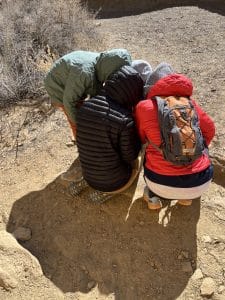
In March of 2020, I was taking a class titled Justice and Reconciliation at Luther Seminary and the professor assigned Desmond and Mpho Tutu’s The Book of Forgiving: The Fourfold Path for Healing Ourselves and Our World as a required text. I grew up with a concept of forgiveness that hurt me and others, with pressure to forgive immediately and never bring up the harm again in an attempt to forgive and forget. I was not looking forward to reading this book, as I had long thought of forgiveness as one more theological tool that enabled abuse and promoted silence around abuse within religious communities.
The kind of forgiveness that the Tutus described is different from what I was taught. In their book, forgiveness is a way to work through the feelings that surround being hurt, without an expectation that the issue will be resolved on an arbitrary timeline or that the hurt person must renew the relationship with the party that hurt them. The stated goal of forgiveness is healing, but there is never an expectation that the hurt will disappear. At the end of each chapter, there is a suggestion for a spiritual practice to accompany each particular stage of forgiveness. Early in the book, the Tutus instructs the reader to find a small stone, which represents a hurt for which the reader seeks forgiveness. When the reader has moved through the process of forgiveness, the Tutus suggest returning the stone to the place where it came from.
I picked up my stone in March 2020 and set it on the kitchen counter. I’d been trying to ignore a difficult situation, hoping that a workplace aggressor would stop the intermittent sexual harassment. When I saw the aggressor say something questionable to a junior colleague, I felt sick. I realized I needed to name what was happening to me, but I was also up for tenure later that summer. The only way to address the issue and make sure that the aggressor could not harm my tenure case was to report the issue to the Title IX office, which would protect me from retaliation. After a drawn-out process, a committee determined that my complaint would not be upheld.
It is hard to describe the full range of emotions that my stone represented. I felt sheer terror, knowing that I was destroying my working relationship with the aggressor. I poured a lot of effort into this working relationship hoping that the sexual harassment would just stop and I felt betrayed by the aggressor. I felt ashamed that I had not had the courage to confront the aggressor the first time it happened. I felt foolish and naive to have been the victim of ongoing sexual harassment. I felt significant loss at having to confront something I had tried so hard to ignore. I experienced intense anxiety over the ways in this situation might other working relationships if I was found out. I feared the ways in which my rollercoaster feelings about the whole situation would impact my family. I worried that others in my workplace would find out and judge me, as women are often judged as guilty when they are victims of sexual harassment. I did not want any of this, and yet reporting was the only real way to make the sexual harassment stop. The personal costs of this process were high.
While many people understand sexual harassment as misplaced desire or attraction, it can also take the form of bullying. The sexual harassment I experienced was bullying with unwanted sexual language. Sexual harassment undermined my dignity by making me feel ashamed and humiliated every time it happened. Over time, it eroded my self worth.
All of these feelings combined to create not just anger but rage. I knew that I needed to let myself feel my feelings, but this rage was powerful and consuming. I started taking long daily walks where I let myself feel my rage but without trying to stoke the fire of the rage. A lot of this walking looked like me rage-storming around the neighborhood, perhaps as many as fifteen hundred miles of rage-storming over 21 months.
For a brief period in 2021, I tried to deny my rage and insist to myself that I needed to be over it. I looked at my stone on the kitchen counter desperate for the rage to be gone. This only intensified my rage, leading me to want to quit my job immediately and metaphorically burn down everything in a 10 mile radius. I started to acknowledge my rage again and it settled to a more familiar level.
In late December of 2021, I set out on my evening walk, intent on checking in with my rage. I reached for it and, for the first time in nearly two years, it was not there. Worried that this was just a fluke, I waited a few more days. Are you there, Rage? It’s me, Nancy. But it was gone and I returned my stone to the path where I found it.
I’m still frustrated about this situation. I’m sure that the anger will come back for brief periods. But the consuming rage I have been experiencing has not returned, even if the hurt remains. I did not let it consume me, though it came close, and eventually my rage burned itself out. This process helped me heal my relationship with myself so that I could move on. This was forgiveness.






4 Responses
Beautiful and brave, Nancy, on so many levels. Thank you for sharing your process of unburdening yourself from your valid rage. Admittedly, reading your story makes me livid; no woman should have to experience any dehumanizing treatment at her workplace or anywhere. Your resilience and resourcefulness in harnessing your agency and mobilizing into action in the face of a seemingly impossible situation are, to me, heroic. I hate that this happened to you. And it’s empowering to read your story of overcoming on a personal level despite an unjust outcome at your workplace.
I’m sorry for your experience of being sexually harassed at work and for the limited and ineffectual options to both protect your job and hold the harasser accountable. Thank you for sharing this story of anger and forgiveness. I too felt the frustrating of teachings on forgiveness that enabled abuse and promoted silence.
Nancy thank you. This approach to anger is so much healthier than what is often talk to us.
I really appreciate that you allowed your rage to be felt for 2 years. Sometimes there’s so much pressure for the amount of time you’re “expected to grieve or be angry when all you really need is the time and freedom to work through your process.
Forgiveness looks different for everyone. You may “forgive” the original thing that was done to you but, as a result of that thing done to you, it might have sparked resentment for (or brought to light) other aspects/experiences/relationships.
Those things need to be worked through also, but it can appear to others that you haven’t forgiven the original act, when in fact, you have. You’re just dealing with the aftermath. It would be like if you had other co-workers who co-signed the abuse. Maybe you work through the original wrong done to you but it damages other relationships along the way.
In my opinion, we need to be careful with our expectation of Forgiveness. Both for ourselves and others. It takes the time that it takes and none of us can truly know where our heart is anyway. The pressure or expectation to forgive can become its own trauma.
Thank you for sharing this.